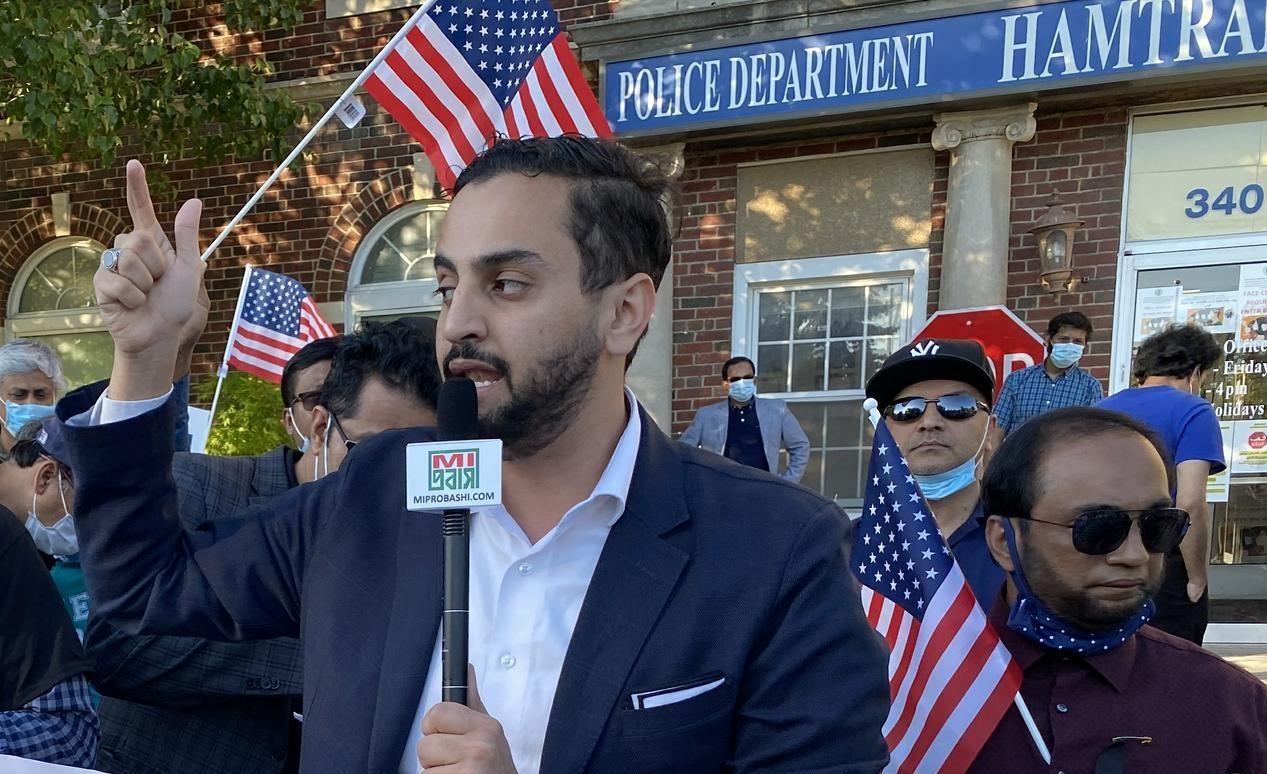A New Voice for Arab Americans

What a young Yemeni American running for state rep in Michigan says about changing politics nationwide
BY ZAHIR JANMOHAMED
The American prospect
braham Aiyash has not been elected to office, but he is already busy recruiting his replacement.
The 26-year-old Yemeni American, who is running for state representative in Michigan, was canvassing a few weeks ago when he met an 18-year-old Bangladeshi American. She grabbed his flyer, saw Bernie Sanders’s endorsement on it, and grew excited.
“Look mom, this is the guy Bernie likes,” she said, not realizing Aiyash was standing right in front of her.
Aiyash stepped back a few feet and lowered his face mask.
“What?” she said, calling the rest of her family outside.
Aiyash then dropped his campaign pitch about his primary—which will be held on August 4—and instead urged her to run for office, maybe even take over his seat one day should he win.
I first took notice of Aiyash when I saw him speak at a Bernie Sanders rally in Dearborn, Michigan, this past March. He has it all, I kept hearing his admirers say. Eloquence. Charisma. Style. But I found myself intrigued for another reason, something others have observed as well.
“He is a completely new type of Arab American politician, especially from the Yemeni community,” said Sally Howell, the director of the Center for Arab American Studies at the University of Michigan-Dearborn.
To understand the significance of Aiyash’s electoral run, it is useful to understand the historyand the demographics of the Arab American community in Michigan. The first wave of Arabs came mostly from Lebanon and Syria in the early 1900s to work in the auto industry in Dearborn, which is just west of Detroit.
Because they often self-identified as white—and were classified as such by the state—these new Arab immigrants were able to flourish, even when Dearborn had an openly segregationistmayor, the late Orville Hubbard, whose statue was recently taken down outside the Dearborn Historical Museum.
Today, around 46 percent of Dearborn’s 98,000 residents are of Arab descent, although Howell would put that percentage much higher. And while it is often referred to as the Arab American capital of the U.S., many Yemenis have often felt politically, economically, and culturally marginalized by other Arabs in Dearborn. This is on account of many factors, among them being their darker complexion.
But Aiyash did not grow up in Dearborn, which may explain his different outlook. When Aiyash’s parents moved from Yemen to the U.S. in the 1980s, they did what many Yemenis do: move instead to areas like Detroit, which is predominantly Black, or neighboring Hamtramck, where Aiyash’s family settled.
f Hamtramck seems bigger than it is, it might be on account of the outsized attention it has received. In 2013, Hamtramck became the first city in the U.S. to have a Muslim majority. In 2016, it elected a Muslim-majority city council.
But Hamtramck, which borders Detroit, is actually only about two square miles and has a population of just 20,000. District 4, where Aiyash was born and raised and which he is now seeking to represent, covers all of Hamtramck and parts of Detroit.
Razi Jafri, the co-director of the forthcoming documentary Hamtramck USA, told me that while Hamtramck was once dominated by immigrants from Poland, today it is about 20 percent Polish, 20 percent Bangladeshi, and 20 percent Yemeni, with the remainder being a mixture of other ethnicities. Since the U.S. census still classifies all Arabs as white, Hamtramck is often perceived as being less diverse than it actually is.
After the city became majority-Muslim, the Hamtramck-based Jafri heard questions, both on the left and on the right, such as: Will residents be forced to wear the hijab? Will ISIS recruit there? Will sharia replace democracy? And are Muslims even capable of being democratic?
Today, Jafri looks at Aiyash’s candidacy as proof of how wrong these anxieties were.
“When you take one of America’s most sacred institutions and trust it in the hands of immigrants and Muslims, democracy can not only survive but thrive,” Jafri said. As proof, he pointed out the efforts, led by Muslims like Aiyash, to reduce voter suppression in the district.
Aiyash is proud that he may become the first Yemeni elected to state office in the U.S., but he is reluctant to bring this up, unless prodded. Likewise, when I asked him about the current conflict in Yemen, Aiyash did reveal that his uncle was recently killed there by militants, but he quickly pivoted back to his main campaign issues: environmental racism, criminal justice reform, and health care.
It was Barack Obama—and specifically his campaign logo—that got him into politics as a 14-year-old back in 2008. As he read up about him, his affection deepened, and he started door-knocking for the candidate.
“People are not attracted by good work alone,” Aiyash said. “People are attracted by shared experiences and shared stories. I sort of felt this with Obama.”
While in college, at Michigan State University, Aiyash got involved in both the Muslim and Black student groups on campus. But his intention was always to pursue medicine, not politics. Donald Trump’s win changed everything.
“I got a call, almost right after the election, about a friend on campus who was harassed for wearing hijab,” Aiyash said.
A few months later, the Trump administration implemented a travel ban, which targeted several Muslim-majority nations, including Yemen. It gutted him and his family.
After completing his degree, he got involved in local politics in Hamtramck and quickly realized that even though the city council is majority-Muslim, the police and fire departments are still predominantly white. At the state level, it was even less welcoming.
“No one there really wants to listen to people who look or talk like me,” he said.
In 2018, he ran for state senator but came up short. He had no plans to run again until this past March when his friend and mentor, Isaac Robinson, passed away at the age of 44 due to a suspected COVID-19 infection. Soon after, Robinson’s parents asked Aiyash if he would run to take over his seat in the Michigan state House.
Aiyash, who has raised around $60,000 for his campaign, is now the front-runner in the election, if only because his long list of endorsements includes the United Auto Workers, the Progressive Caucus, and Sanders, who is wildly popular in his district.
Howell, who has known Aiyash for years, sees his run as emblematic of shifts in the Arab American community. Today, she observed, young Arab Americans are more likely to identify as people of color, in contrast to their parents. They are also much more to the left and much more willing to engage in self-reflection.
Aiyash—like Detroit’s congresswoman Rashida Tlaib, who is Palestinian—has been outspoken about the need for Arab Americans to speak up about anti-Blackness within the community. He credits the Black Lives Matter movement for changing his outlook.
“I used to be embarrassed about being from Hamtramck. I used to hear people say it’s smelly, it’s backward, it’s so full of Muslims. But now I am proud of being from here,” Aiyash said.
At the moment, Aiyash does have a formidable challenger in Michele Oberholtzer, who is from nearby Chelsea, which is predominantly white. And while Aiyash admires her work on housing rights in Hamtramck, he wondered if someone who looks like him could ever run in her hometown.
I asked Oberholtzer about this and she concurred. But she added that what she loves about Hamtramck is that “no one group dominates here, and everyone is the same.”
Aiyash agrees with her first point but not her second. While in high school, Aiyash was arrested after a fight broke out at his school. He pleaded with the police officers that he had nothing to do with the fight, but it made no difference. One pinned him to the ground while another officer joked that Aiyash should be forced to eat bacon. All charges were later dropped against Aiyash.
“I get what she is saying,” Aiyash said, responding to Oberholtzer, who is white. “But I am still a person of color and we are not really treated equally here.”

